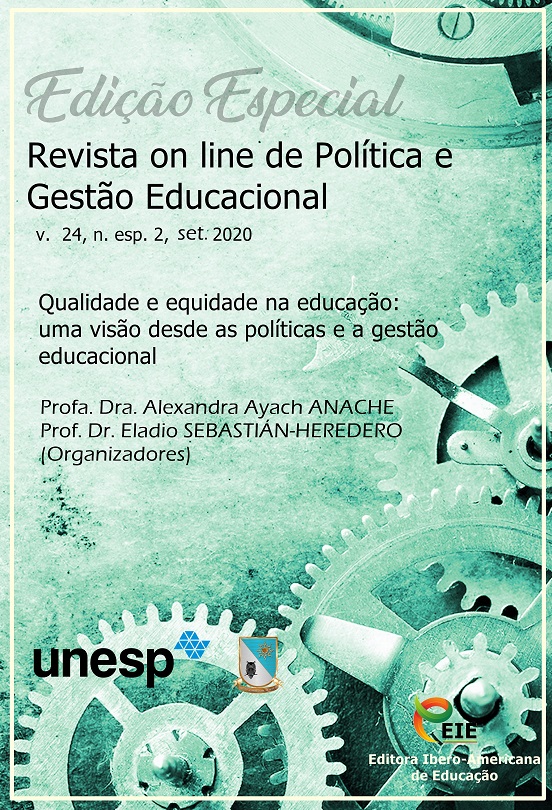The classroom management of Physical Education teachers in Basic Education
DOI:
https://doi.org/10.22633/rpge.v24iesp2.14327Keywords:
Classroom management, Physical education, Basic education, Teaching-learning process.Abstract
This article aims to point out how the relationship between classroom management and the teaching of Physical Education content occurs. The purpose is, therefore, to know and better understand a set of teacher behaviors, usually grouped under the name of Classroom Management, dependent on a diverse set of beliefs and theoretical perspectives, on, among many other aspects, teaching, the teacher's roles and tasks. Thus, it is important to understand this existing relationship, in order to see how this teaching-learning process takes place with regard to the appropriation of specific knowledge of this school discipline by students. In this direction, to carry out this article, as a theoretical contribution, we use among other authors: Libâneo (2004), Paro (2007), Dal Prette (2007), Daólio (1994) and Brophy (2011); and to collect the data, that are analyzed later, we interviewed seven teachers of the elementary school II of Physical Education, effective in schools of the municipal public net of a city of the paulista interior, and as results of this research, among others aspects, we detach that the management of the classroom of the teacher of Physical Education, passes for its way of speaking, walk, dress, gesticulate, demonstrate a motor task, their behavior and their relationship with the students, in addition to the pedagogical practices that they carry out in school, all analyzed together with the contents that they may select to teach in their classes, something that appeared repeatedly in the speeches of the teachers with whom the research was developed.
Downloads
References
ARENDS, R. Aprender a ensinar. Lisboa: Mc Graw-Hill, 2005.
BOURDIEU, P. Escritos da Educação. In: NOGUEIRA, A. M.; CATANI, A. (org). Escritos da Educação. Rio de Janeiro: Vozes, 1998.
BRASIL. Secretaria de Educação Fundamental. Parâmetros Curriculares Nacionais: Educação, Secretaria de Educação ao Fundamental. Brasília: MEC/SEF, 1997.
BROPHY, J. History of Classrroom Management. In: EVERTSON, C. M.; WEINSTEIN, C. S. Handbook of classroom management: research, practice, and contemporary issues. New York/London: Routledge, 2011, 2011. p. 17-46.
DAÓLIO, J. A representação do trabalho do professor de Educação Física na escola: Do corpo matéria-prima ao corpo cidadão. 1994. Dissertação (Mestrado) – Universidade de São Paulo, 1994.
DEL PRETTE, Z. A. A Psicologia das relações interpessoais: vivencias para o trabalho em grupo. 5. ed. Petrópolis: Vozes, 2007.
LIBANEO, J. C. Organização e gestão da escola: teoria e prática. 5. ed. Goiânia: Alternativa, 2004.
MONTEIRO, A. M. F. da C. Professores: entre saberes e práticas. Educação & Sociedade, Campinas, v. 22, n. 74, p. 121-142, abr. 2001. Disponível em: http://www.scielo.br/pdf/es/v22n74/a08v2274.pdf. Acesso em: 22 jul. 2020.
PARO, V. H. Gestão escolar, democracia e qualidade do ensino. São Paulo: Editora Ática, 2007.
PERRENOUD, P. Dez novas competências para ensinar: convite a viagem. Porto Alegre: Artmed, 2000.
VASCONCELLOS, C. dos S. Desafio da qualidade de educação: gestão da sala de aula. São Paulo: Libertad, 2014.
WALTERS, J.; FREI, S. Gestão do comportamento e da disciplina em sala de aula. São Paulo: Special Book, 2009.
Downloads
Published
How to Cite
Issue
Section
License
Copyright (c) 2020 Revista on line de Política e Gestão Educacional

This work is licensed under a Creative Commons Attribution-NonCommercial-ShareAlike 4.0 International License.
Manuscritos aceitos e publicados são de propriedade da Revista on line de Política e Gestão Educacional. É vedada a submissão integral ou parcial do manuscrito a qualquer outro periódico. A responsabilidade do conteúdo dos artigos é exclusiva dos autores. É vedada a tradução para outro idioma sem a autorização escrita do Editor ouvida a Comissão Editorial Científica.











